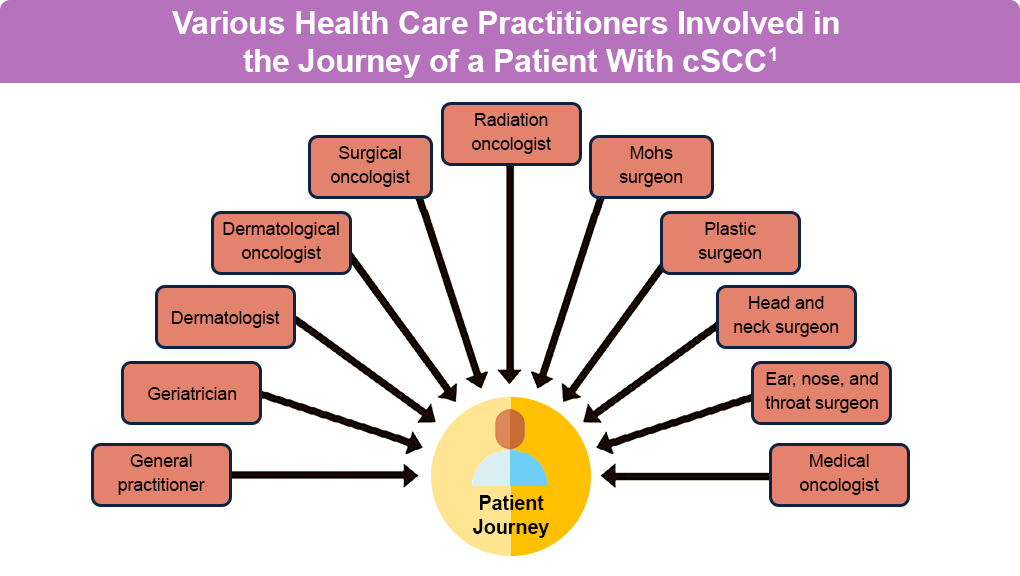Multidisciplinary Care
An effective management plan for cutaneous squamous cell carcinoma (cSCC) requires strategic collaboration among a diverse group of specialists, including dermatologists, dermatopathologists, radiation oncologists, nurse practitioners, Mohs surgeons, medical oncologists, head and neck surgeons, and other members of the multidisciplinary team. Establishing clear referral pathways and a network of specialists ensures patients receive timely, risk-assessment-based, comprehensive care, overcoming barriers to optimal management.
Key Elements of a Multidisciplinary Approach
Prompt and appropriate referrals are crucial for rare or high-risk cSCC cases. Networks that facilitate these referrals can significantly improve patient outcomes. Experts from the Association of Community Cancer Centers’ program, Advanced Non-Melanoma Skin Cancers: Effective Practices in Multidisciplinary Care, have outlined strategies for effectively managing NMSC, emphasizing cross-specialty collaboration.2
- Communication: Building close relationships within the multidisciplinary team, including dermatopathologists/pathologists, to ensure the reporting of high-risk features. Enhanced patient-provider communication is also critical
- Risk Identification: Identifying high-risk NMSC and patients at high risk for recurrence or relapse
- Psychosocial Impact: Addressing the social, emotional, physical, and economic burdens faced by patients diagnosed with advanced NMSC
- Therapeutic Considerations: Evaluating clinical considerations for various therapeutic approaches, including immunotherapy, radiation therapy, adjuvant therapies, and clinical trial enrollment for patients with cSCC
In some centers, specialists like dermatologists, Mohs surgeons, or medical oncologists may not be readily accessible. To optimize the referral process, it is important to1:
- Identify local expertise and specialists
- Establish effective communication within the team
- Develop streamlined referral pathways
- Determine obstacles and discuss management strategies
- Inform general practitioners and geriatricians about the prevalence of high-risk tumors and how to access multidisciplinary assessments
Constructing clear referral pathways and establishing a network of specialists that manage non-melanoma skin cancer can streamline the management process and ensure patients receive timely, risk assessment based, comprehensive care by overcoming any barriers to optimal management. Multidisciplinary teams ensure the most appropriate strategy is tailored to each patient’s unique profile from diagnosis to follow-up.3 Continued communication post-referral and ongoing care with the primary skincare team are essential for optimal patient outcomes.
Multidisciplinary Tumor Boards
Multidisciplinary tumor boards are invaluable, especially when a clear treatment path is not defined or when access to certain specialties or novel treatment options is limited. These boards should be consulted when1:
- The likelihood of curing a patient’s cancer drops significantly
- More than two or three risk features are present
- Nonsurgical treatments are considered
Although tumor boards provide a multifaceted perspective, they may not meet frequently in some regions. In such cases, a regional team can assist with treatment planning between meetings, with decisions discussed at the next tumor board meeting for additional insights.
Tumor boards typically include medical oncologists, surgical oncologists, radiation oncologists, dermatology oncologists, radiologists, and pathologists. Including supporting physicians, such as geriatricians for elderly patients and rheumatologists or gastroenterologists for patients with autoimmune diseases, can provide a comprehensive approach to patient care.1
By constructing a robust multidisciplinary plan tailored to regional needs, healthcare providers can ensure that patients with cSCC receive the best possible care, improving both cosmetic and long-term outcomes.
References
- Claveau J, Archambault J, Ernst DS, et al. Multidisciplinary management of locally advanced and metastatic cutaneous squamous cell carcinoma. Curr Oncol. 2020;27:e399-e407. doi:10.3747/co.27.6015
- Association of Community Cancer Centers. Advanced Non-Melanoma Skin Cancers: Effective Practices in Multidisciplinary Care: Leveraging Multidisciplinary Networks to Improve Care. Oncol Issues. 2023;38:61-63. (https://www.accc-cancer.org/docs/projects/lung-cancer/accc_oi_nmsc-_article_4_19.pdf).
- García-Foncillas J, Tejera-Vaquerizo A, Sanmartín O, et al. Update on management recommendations for advanced cutaneous squamous cell carcinoma. Cancers (Basel). 2022;14:629. doi:10.3390/cancers14030629
All URLs accessed September 16, 2025



